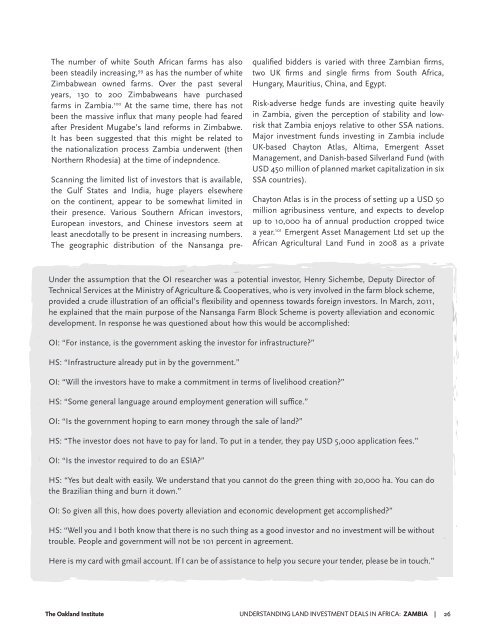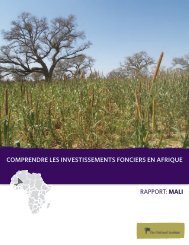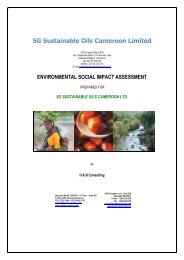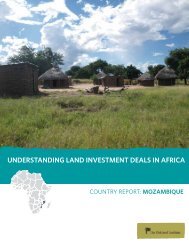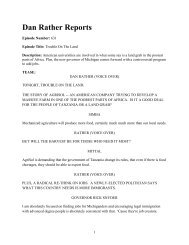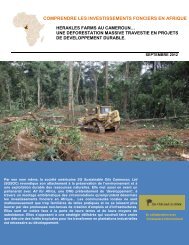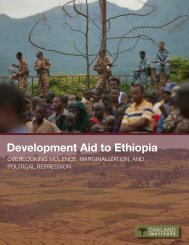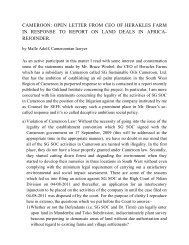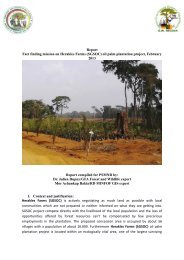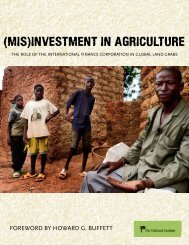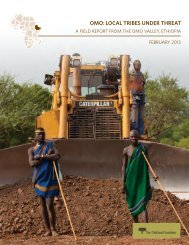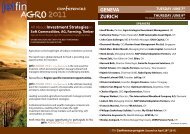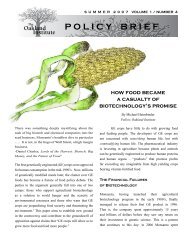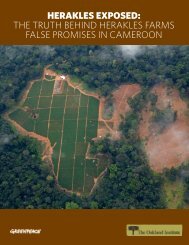Zambia - Oakland Institute
Zambia - Oakland Institute
Zambia - Oakland Institute
Create successful ePaper yourself
Turn your PDF publications into a flip-book with our unique Google optimized e-Paper software.
The number of white South African farms has also<br />
been steadily increasing, 99 as has the number of white<br />
Zimbabwean owned farms. Over the past several<br />
years, 130 to 200 Zimbabweans have purchased<br />
farms in <strong>Zambia</strong>. 100 At the same time, there has not<br />
been the massive influx that many people had feared<br />
after President Mugabe’s land reforms in Zimbabwe.<br />
It has been suggested that this might be related to<br />
the nationalization process <strong>Zambia</strong> underwent (then<br />
Northern Rhodesia) at the time of indepndence.<br />
Scanning the limited list of investors that is available,<br />
the Gulf States and India, huge players elsewhere<br />
on the continent, appear to be somewhat limited in<br />
their presence. Various Southern African investors,<br />
European investors, and Chinese investors seem at<br />
least anecdotally to be present in increasing numbers.<br />
The geographic distribution of the Nansanga prequalified<br />
bidders is varied with three <strong>Zambia</strong>n firms,<br />
two UK firms and single firms from South Africa,<br />
Hungary, Mauritius, China, and Egypt.<br />
Risk-adverse hedge funds are investing quite heavily<br />
in <strong>Zambia</strong>, given the perception of stability and lowrisk<br />
that <strong>Zambia</strong> enjoys relative to other SSA nations.<br />
Major investment funds investing in <strong>Zambia</strong> include<br />
UK-based Chayton Atlas, Altima, Emergent Asset<br />
Management, and Danish-based Silverland Fund (with<br />
USD 450 million of planned market capitalization in six<br />
SSA countries).<br />
Chayton Atlas is in the process of setting up a USD 50<br />
million agribusiness venture, and expects to develop<br />
up to 10,000 ha of annual production cropped twice<br />
a year. 101 Emergent Asset Management Ltd set up the<br />
African Agricultural Land Fund in 2008 as a private<br />
Under the assumption that the OI researcher was a potential investor, Henry Sichembe, Deputy Director of<br />
Technical Services at the Ministry of Agriculture & Cooperatives, who is very involved in the farm block scheme,<br />
provided a crude illustration of an official’s flexibility and openness towards foreign investors. In March, 2011,<br />
he explained that the main purpose of the Nansanga Farm Block Scheme is poverty alleviation and economic<br />
development. In response he was questioned about how this would be accomplished:<br />
OI: “For instance, is the government asking the investor for infrastructure”<br />
HS: “Infrastructure already put in by the government.”<br />
OI: “Will the investors have to make a commitment in terms of livelihood creation”<br />
HS: “Some general language around employment generation will suffice.”<br />
OI: “Is the government hoping to earn money through the sale of land”<br />
HS: “The investor does not have to pay for land. To put in a tender, they pay USD 5,000 application fees.”<br />
OI: “Is the investor required to do an ESIA”<br />
HS: “Yes but dealt with easily. We understand that you cannot do the green thing with 20,000 ha. You can do<br />
the Brazilian thing and burn it down.”<br />
OI: So given all this, how does poverty alleviation and economic development get accomplished”<br />
HS: “Well you and I both know that there is no such thing as a good investor and no investment will be without<br />
trouble. People and government will not be 101 percent in agreement.<br />
Here is my card with gmail account. If I can be of assistance to help you secure your tender, please be in touch.”<br />
The <strong>Oakland</strong> <strong>Institute</strong> UNDERSTANDING LAND INVESTMENT DEALS IN AFRICA: ZAMBIA | 26


